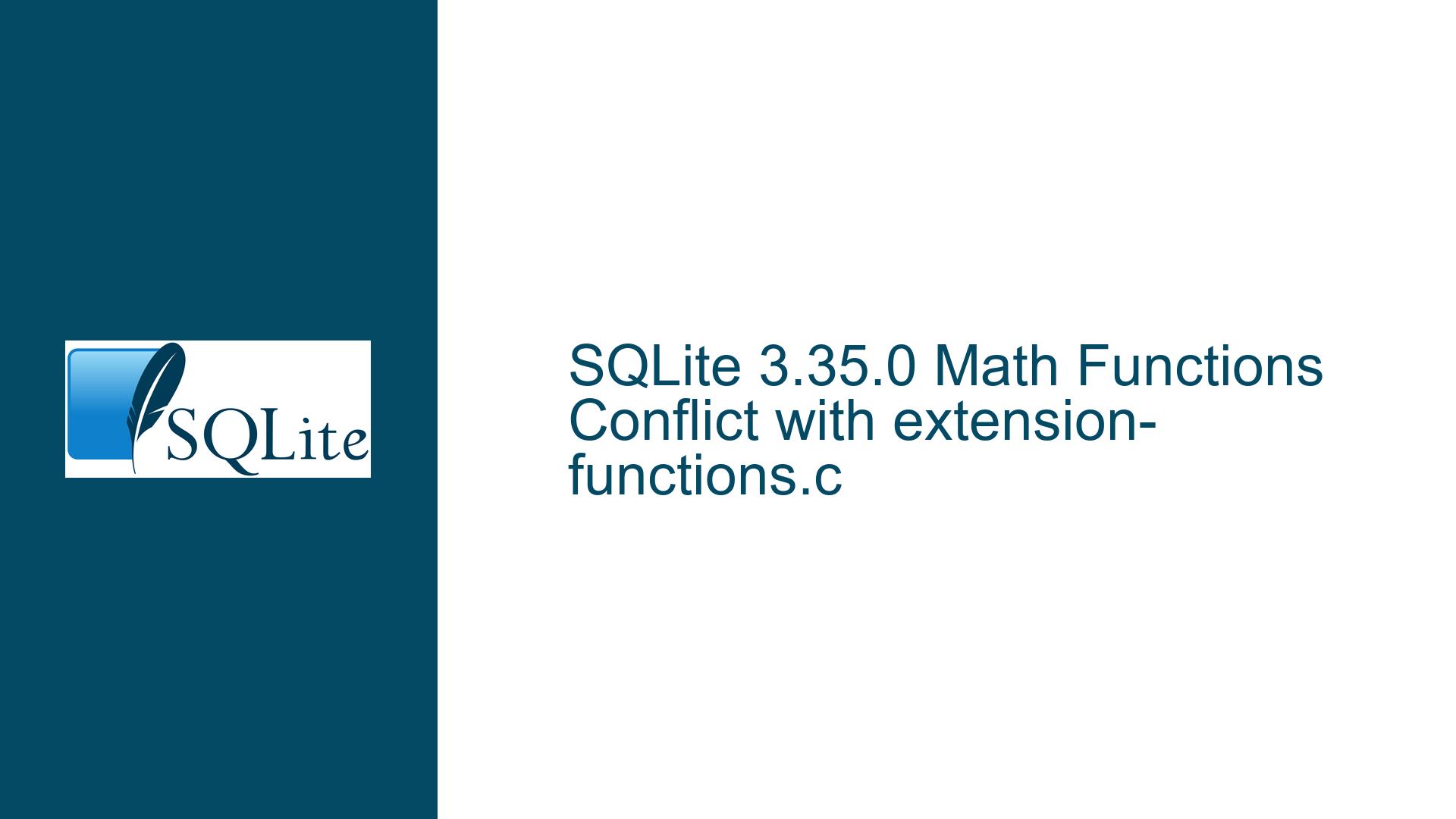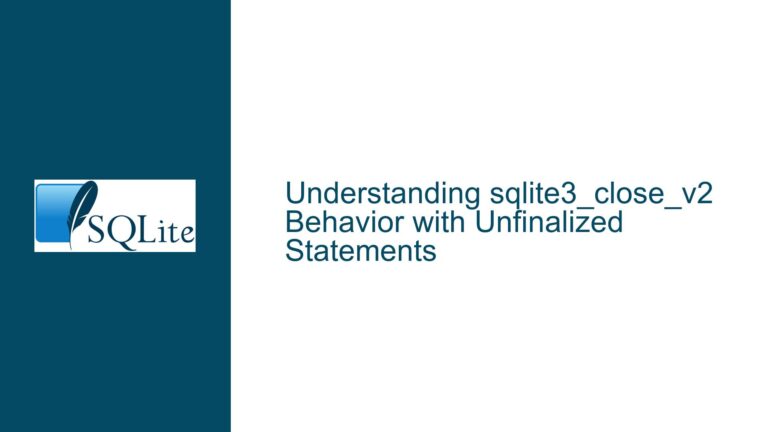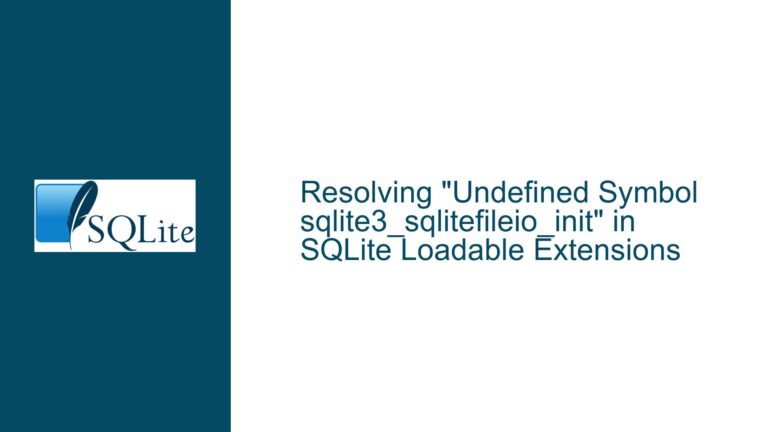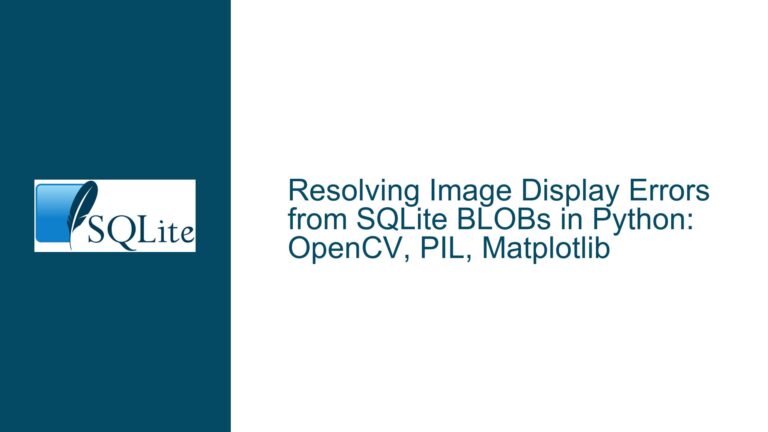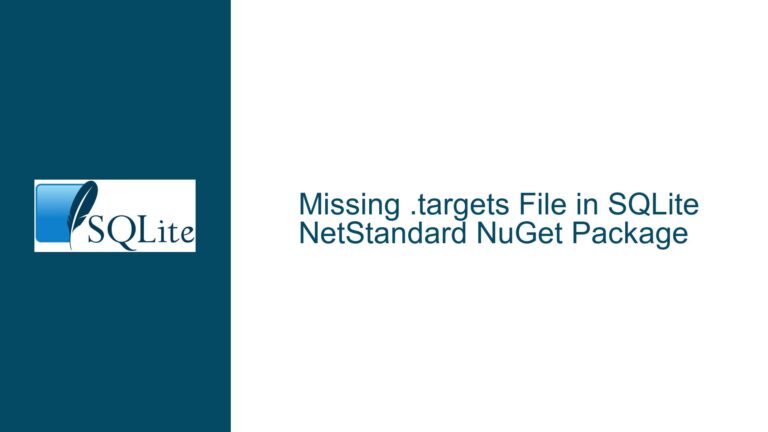SQLite 3.35.0 Math Functions Conflict with extension-functions.c
SQLite 3.35.0 Math Functions and extension-functions.c Compatibility Issues
The introduction of new math functions in SQLite 3.35.0 has led to compatibility issues with the widely used extension-functions.c file. This file, which has been a popular contribution to SQLite, provides additional mathematical and statistical functions such as stdev, variance, mode, median, lower_quartile, and upper_quartile. However, with the release of SQLite 3.35.0, several functions that were previously only available through extension-functions.c have been integrated into the core SQLite distribution. This integration has resulted in name collisions during compilation, particularly with the sign function, leading to errors such as:
target/sqlite-3.35.0-Mac-x86_64/sqlite3.c:234703:13: error: redefinition of 'signFunc'
static void signFunc(sqlite3_context *context, int argc, sqlite3_value **argv){
^
target/sqlite-3.35.0-Mac-x86_64/sqlite3.c:120439:13: note: previous definition is here
static void signFunc(
^
target/sqlite-3.35.0-Mac-x86_64/sqlite3.c:235909:20: error: invalid application of 'sizeof' to an incomplete type 'const struct FuncDef []'
for(i=0; i<sizeof(aFuncs)/sizeof(aFuncs[0]); i++){
^~~~~~~~
2 errors generated.
The primary issue arises from the fact that both the core SQLite library and extension-functions.c define the same functions, leading to duplicate definitions during compilation. This is particularly problematic for users who rely on extension-functions.c for its additional statistical functions, as they now face a dilemma: either modify their existing code to remove the conflicting functions or find a way to make both sets of functions coexist.
Interrupted Write Operations Leading to Index Corruption
The root cause of the compilation errors lies in the overlapping functionality between the core SQLite library and extension-functions.c. Specifically, the sign function, which is now part of the core SQLite distribution, was previously defined in extension-functions.c. This overlap results in a redefinition error during compilation. Additionally, the extension-functions.c file includes an array of function pointers that reference the signFunc function. When the signFunc function fails to compile due to the redefinition error, the array of function pointers becomes incomplete, leading to further compilation errors when the sizeof operator is applied to it.
Another subtle issue arises from the differences in the implementation of certain functions between the core SQLite library and extension-functions.c. For example, the log function in the core SQLite library computes the natural logarithm (ln), whereas the log function in extension-functions.c computes the base-10 logarithm (log10). This discrepancy can lead to unexpected results if the functions are used interchangeably without proper consideration.
The problem is further compounded by the fact that extension-functions.c is not officially supported by the SQLite development team. It is a contributed file that has been available on the SQLite website for some time, but it is not part of the core SQLite source repository. As a result, users who encounter issues with extension-functions.c must either find their own solutions or seek help from the community.
Implementing PRAGMA journal_mode and Database Backup
To resolve the compatibility issues between SQLite 3.35.0 and extension-functions.c, several approaches can be taken. The most straightforward solution is to remove the conflicting functions from extension-functions.c. This can be done by manually editing the extension-functions.c file to remove or comment out the definitions of functions that are now part of the core SQLite distribution. For example, the signFunc function can be removed from extension-functions.c to avoid the redefinition error.
Another approach is to compile extension-functions.c as a separate shared object and load it dynamically at runtime. This allows the functions in extension-functions.c to override those in the core SQLite library without causing compilation errors. However, this approach requires careful management of function names to avoid conflicts at runtime. For example, if both the core SQLite library and extension-functions.c define a function with the same name, the behavior of that function may depend on the order in which the shared objects are loaded.
For users who need to maintain compatibility with both the core SQLite library and extension-functions.c, it may be necessary to modify the code of extension-functions.c to peacefully coexist with the new math functions in SQLite 3.35.0. This can be done by renaming the conflicting functions in extension-functions.c or by adding conditional compilation directives to exclude the conflicting functions when compiling against SQLite 3.35.0 or later.
In cases where the differences in function implementations between the core SQLite library and extension-functions.c are significant, it may be necessary to adjust the SQL code to explicitly specify the desired function. For example, instead of using the log function, which has different meanings in the core SQLite library and extension-functions.c, users can use LN, LOG10, or LOG2 to explicitly specify the type of logarithm they need. This approach ensures consistent behavior across different versions of SQLite and different database systems.
Finally, users who rely on extension-functions.c for its statistical functions should consider contributing their fixes and improvements back to the community. The original author of extension-functions.c may no longer be actively maintaining the code, but there are community-maintained forks available on platforms like GitLab. By contributing to these forks, users can help ensure that extension-functions.c remains compatible with future versions of SQLite and continues to meet the needs of the community.
In conclusion, the compatibility issues between SQLite 3.35.0 and extension-functions.c can be resolved through careful management of function definitions, dynamic loading of shared objects, and explicit specification of function names in SQL code. By taking these steps, users can continue to benefit from the additional functionality provided by extension-functions.c while avoiding the pitfalls of name collisions and differing function implementations.
